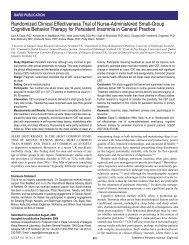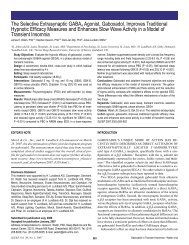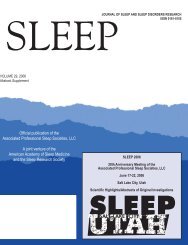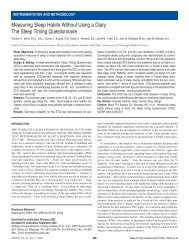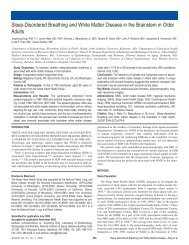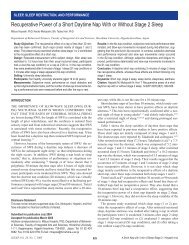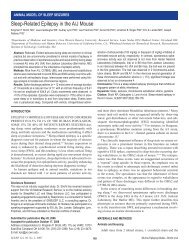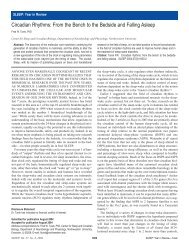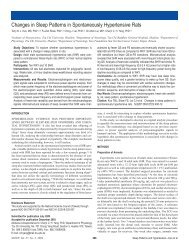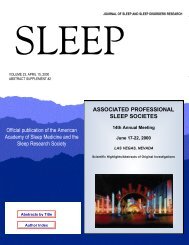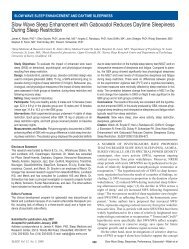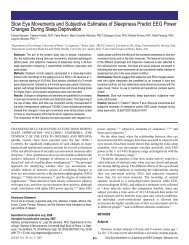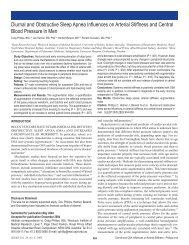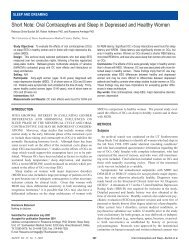SLEEP 2011 Abstract Supplement
SLEEP 2011 Abstract Supplement
SLEEP 2011 Abstract Supplement
You also want an ePaper? Increase the reach of your titles
YUMPU automatically turns print PDFs into web optimized ePapers that Google loves.
A. Basic Science IX. Learning, Memory and Cognition<br />
0245<br />
EFFECT OF <strong>SLEEP</strong> DEPRIVATION ON ITEM AND SOURCE<br />
MEMORY<br />
Kubin ZJ 1 , Mehalick ML 1,2 , Jackson ML 1 , Whitney P 2 , Hinson JM 2 ,<br />
Van Dongen H 1<br />
1<br />
Sleep and Performance Research Center, Washington State University,<br />
Spokane, WA, USA, 2 Department of Psychology, Washington State<br />
University, Pullman, WA, USA<br />
Introduction: In this pilot study, we investigated the effect of sleep deprivation<br />
on source memory as contracted with item memory. Source<br />
memory, which involves remembering the source (as opposed to the<br />
content) of an item of information, has been shown to involve frontal<br />
brain areas, whereas item memory utilizes predominantly temporal and<br />
parietal brain areas. We employed a source memory task, during which<br />
a list of 96 words was read to the subjects, twice, through headphones<br />
using male and female voices. A series of words from the list mixed<br />
with new words was then visually presented to the subjects, and they<br />
were asked whether or not they had heard the word (item memory); and<br />
whether the source was a male or female voice (source memory).<br />
Methods: Out of a total of N=19 subjects (ages 20-55y, 9f), the first<br />
ten subjects completed an overnight laboratory sleep deprivation experiment,<br />
during which the source memory test was administered at 21:30,<br />
00:45 and 04:00. The other nine subjects were studied afterwards in a<br />
control experiment for which they entered the laboratory to perform the<br />
source memory test at 09:30, 12:45 and 16:00 (12 hours out of phase<br />
with the first group). The number of items recognized correctly (hits)<br />
and incorrectly (false alarms), and the number of items of which the<br />
source was identified correctly were compared between sleep-deprived<br />
subjects and controls using mixed-effects ANOVA.<br />
Results: Sleep deprivation resulted in significantly more false alarms<br />
for item memory (F[1,34]=4.59, P=0.040), but there was no difference<br />
with controls for item hits (F[1,34]=2.30, P=0.14). No significant difference<br />
was found between groups for source memory (F[1,34]=0.07,<br />
P=0.79). There were no significant effects of test session for item and<br />
source memory outcomes (F[2,34]≤1.53, P≥0.23), and no significant interactions<br />
(F[2,34]≤0.86, P≥0.43).<br />
Conclusion: This pilot study suggested that although one night of sleep<br />
deprivation increased the number of false alarms for item memory, this<br />
duration of sleep deprivation may not impair source memory.<br />
Support (If Any): CDMRP award W81XWH-05-1-0099 and DURIP<br />
grant FA9550-06-1-0281<br />
0246<br />
ENHANCEMENT EFFECT OF <strong>SLEEP</strong> ON NOVEL WORD<br />
ASSOCIATION: AN EVENT-RELATED POTENTIAL STUDY<br />
Lin C 1,2 , Yang C 1,2<br />
1<br />
Department of Psychology, National Cheng-Chi University, Taipei,<br />
Taiwan, 2 Research Center for Mind, Brain and Learning, National<br />
Cheng-Chi University, Taipei, Taiwan<br />
Introduction: The effect of sleep on declarative memory remains contradictory.<br />
Prior studies showed that learning of related word pairs benefited<br />
from sleep consistently, learning of unrelated word pairs however<br />
showed mixed results. It is possible that the behavioral measures used in<br />
previous studies are not sensitive enough to reveal subtle effects of sleep<br />
on new association. N400, an event-related potential (ERP) component<br />
reflecting relatedness among words in semantic memory, was used in the<br />
present study to investigate effect of sleep on the physiological process<br />
underlying new association of unrelated word pairs.<br />
Methods: Eleven subjects (4 males, mean age=22.9) participated in the<br />
study. They were randomly assigned to either Sleep group or Wakefulness<br />
group. In the learning phase, participants were asked to memorize<br />
80 visually presented unrelated word-pairs, and followed by a pre-test<br />
phase with a recognition task. The participants then underwent either<br />
nocturnal sleep (Sleep group) or sleep deprivation (Wakefulness group),<br />
and a post-test was conducted after subjects had one night of recovery<br />
sleep. During both pre-test and post-test sessions, primes and target<br />
words were presented successively for the subjects to judge whether<br />
they are among the original pairs or new pairs. ERPs were recorded during<br />
both test phases.<br />
Results: The behavioral data showed that improvement of recognition<br />
from pre-test to post-test were not different between Sleep and Wakefulness<br />
groups (t=1.61, p=0.14). Decrease in reaction time however was<br />
greater following sleep compared to wakefulness (t=2.80, p



